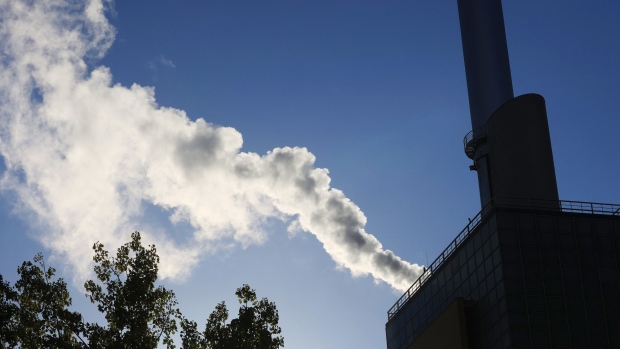Feb 5, 2024
Germany Paves Way for Major Expansion of Gas-Fired Power Plants
, Bloomberg News

(Bloomberg) -- Germany approved plans to finance one of Europe’s biggest expansions of gas-fired power plants, on the condition that developers convert to hydrogen in future years.
The government agreed to go ahead with four short-term tenders for up to 10 gigawatts, translating to about 15 to 20 new plants. It requires developers to upgrade stations to burn hydrogen sometime between 2035 and 2040, and also leaves open room for carbon capturing and storage technologies, according to a statement Monday.
The decision — which comes almost a year after the proposal was first unveiled — follows weeks of intense talks between Chancellor Olaf Scholz and his two coalition parties. The measure will cost between €15 billion ($16.1 billion) and €20 billion over the next 20 years, according to people familiar with the matter, and includes subsidies for investment and operational costs.
Germany is racing to build low-carbon energy while phasing out coal, though adding capacity that’s initially fed by gas is controversial. The planned timeline puts at risk Germany’s pledge to achieve emissions-free power production by 2035, which it agreed with France and five other European countries at the end of last year.
Last month, the government agreed to set aside €7.55 billion for the gas power plan, which aims to stoke private investment in the new plants. Further subsidies should come from the country’s climate and transformation fund, which is already maxed out.
The government will decide in 2032 exactly when the new gas-power plants will switch over to hydrogen, without specifying that this should only be a green gas from renewable sources. It’s no longer pursuing an earlier plan to also tender 8.8 gigawatts of units that would immediately run on hydrogen, as the country’s green gas initiative is still in the draft stage.
The gas plan must still be approved by the European Commission, which previously raised concerns about an expansion of fossil fuels. Germany, Europe’s largest economy, last year shuttered its remaining nuclear reactors, and the government wants to bring forward a phaseout of coal to 2030 — eight years earlier than scheduled.
Expected Shortage
“The expansion of gas-fired power plants is necessary because Germany is also facing a power shortage in the 2030s due to a simultaneous increase in demand for electricity, especially in the transport and heating sectors,” said Claudia Günther, an analyst at think tank Aurora Energy Research.
The new units will provide baseload — or round-the-clock — power, since renewables such as solar and wind generate intermittently. By the summer, the government also aims to present plans for “a market-based, technology-neutral capacity mechanism,” which should be operational by 2028 at the latest, it said.
This mechanism offers a “bouquet of climate-friendly capacities” at low cost, said Michael Kruse, a lawmaker from the Free Democratic party who focuses on energy. Other possible energy sources are hydropower, biomass, and geothermal, he said.
The government wants to address the usage of carbon capture and storage technologies on power plants in a carbon management strategy to be presented later this year. At present, the transport and storage of carbon dioxide isn’t allowed in the country.
Industry Reaction
German utility Uniper SE welcomed the gas-power plan, with Chief Executive Officer Michael Lewis saying that “swift action is urgently needed” because the new plants and storage facilities will take several years to build.
“We currently assume that Uniper will build some of the new capacity for Germany,” he said in a statement. “As soon as we have been able to examine the details, we will decide whether and with which investments we will participate.”
Coal-power utility RWE AG also stated it aims at participating in the tenders, while Germany’s second biggest coal miner Lausitz Energie Bergbau AG said its core concerns with regard to pipeline access and carbon reduction must be taken into account. The company proposes that the bids should be weighted according to the carbon dioxide emissions avoided by the replacement.
The German Chamber of Commerce and Industry, known as DIHK, warned that existing power plants should only be shut down when new units are connected to the grid. The state’s renewed intervention in the electricity market remains a “balancing act,” it said.
A coalition of eight large German environmental groups warned the plans would “open a Pandora’s box” that might prolong the country’s dependence on fossil natural gas. “This massively jeopardizes the achievement of climate neutrality,” they said.
--With assistance from Carolynn Look and Amanda Jordan.
(Updates with cost estimate in third paragraph as well as RWE, LEAG, environmental groups’ statements lower down.)
©2024 Bloomberg L.P.






